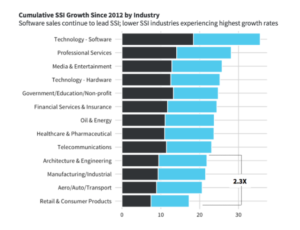Brand advocacy is not a new concept, but it has recently undergone a transformation (thanks to social media) and is experiencing a resurgence within the tech industry.
But what exactly does ‘brand advocacy’ and ‘brand advocates’ mean? It’s simply anyone who speaks or writes about your brand in a positive light – a brand champion of sorts – and encourages others to engage with your products or services.
While it’s tempting to look outside your organization for those brand champions, it’s in your best interest to look inside your organization; your employees can be some of the best brand champions you’ll ever find. Many high growth technology companies have figured this out and are building massive brand cachet through Employee Advocacy.
Employee Advocacy
Employee advocates have traditionally been those employees who take it upon themselves to spread the good word about your brand through their own personal online channels, most recently, their social media channels.
How can these brand advocates become a key differentiating factor? According to MSL Group, employees are (on average) connected to 10 times more people than your company’s brand, and that branded content shared by employees will spread 24X further as compared to brand messages posted on a brand’s official social media channels.
A study by Nielsen may offer an explanation for why these brand messages travel so far. The study shows, 90% of customers trust product or service recommendations from their own connections. People trust people more than brands. Therefore, making your employees a partner is key.
Why is Employee Advocacy Important for Tech Companies
Many organizations have caught on to the benefits of Employee Advocacy and have taken it one step further, rolling out a formalized Employee Advocacy program. Interestingly, high growth technology companies have been the early (and rapid) adopters of Employee Advocacy. In a study by Hinge Marketing, nearly 31% of all high growth firms now have a formal Employee Advocacy program in place – double the average of all other companies.
The tech industry as a whole is seen as forward thinking, early adopters with passionate employees. It’s time to leverage this and work with your best brand advocates – your employees – to amplify company messages, increase reach, and even generate leads through social media. People connect to authenticity, aligning your tech product or service to the authentic voices of your employees builds trust with consumers and helps your brand stand out.
Technology is the Driving Force in Social Selling
Recently, LinkedIn collected data across different regions and industries regarding how sales professionals are deriving value from social networks. The metric for success they used was LinkedIn Sales Navigator (SSI), which tracks a sales professional’s engagement on LinkedIn.

From 2012 to 2016, the data uncovered several industries leading the new frontier in social selling. The standout industry was technology which had the highest growth rate. Despite the growth, the data above also indicates a massive opportunity to drive adoption of social selling within the technology industry.
Benefits of Formalized Employee Advocacy Programs
Employee Advocacy can be a powerful force for tech companies, yielding several benefits such as strengthened brand sentiment, decreased advertising costs, improved brand authenticity, increase in lead generation, better employee engagement, improvement in talent recruitment, shortening the sales cycles…and the list goes on.
In order to tap into all the potential benefits of employee advocacy, it’s imperative to adopt a formalized approach with strategic goals and objectives. This formalized approach will help to increase adoption rates, streamline content sharing and mitigate risk associated with employees advocating for your brand on social media.
5 Tips To Get Your Company Ready for Employee Advocacy
- Make social media education a top priority. Integrating it into your company’s culture will be key as not everyone has a social channel or are active users.
- Create social media guidelines to comply with your company regulations on what and what not to post. This will give both employees and leadership a greater comfort level in sharing on social.
- Build in a rewards and recognition program. This will help motivate, reward, and inspire outstanding employee advocates. This will also result in higher program commitment and retention.
- Securing leadership buy-in for the Employee Advocacy program is imperative. This will get everyone motivated and committed to the program. Leadership should also set the standard for how employees should be sharing and engaging with their networks.
- Scoping the right technology platform that will streamline and scale efforts is the key to employee advocacy program success. Users must be able to easily access and share; managers must be able to easily measure and monitor program ROI in order to create sustainable long-term value.
Implementing a structured employee advocacy program will allow your company to better define, build and differentiate your brand by leaning the authenticity and positivity of your employees.





